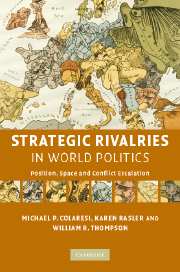Book contents
- Frontmatter
- Contents
- List of figures
- List of tables
- Acknowledgments
- Part I About strategic rivalries
- Part II The dangers of strategic rivalries: Crisis behavior and escalation
- 4 Protracted conflict and crisis escalation
- 5 Serial crisis behavior and escalating risks
- Part III Playing to type: Spatial and positional issues in strategic rivalries
- Part IV Filling in some steps to war
- Part V Strategic rivalries and conflict
- References
- Index
5 - Serial crisis behavior and escalating risks
Published online by Cambridge University Press: 22 September 2009
- Frontmatter
- Contents
- List of figures
- List of tables
- Acknowledgments
- Part I About strategic rivalries
- Part II The dangers of strategic rivalries: Crisis behavior and escalation
- 4 Protracted conflict and crisis escalation
- 5 Serial crisis behavior and escalating risks
- Part III Playing to type: Spatial and positional issues in strategic rivalries
- Part IV Filling in some steps to war
- Part V Strategic rivalries and conflict
- References
- Index
Summary
Over the last decade considerable progress has been made in deciphering the causes of international war and conflict. Theoretical advances have been matched by empirical evidence uncovering for instance the democratic peace phenomena. Yet one potentially important research question has gone nearly untouched. How are crises between the same adversaries related to each other, if, indeed, they are? This question is important in its own right: does previous conflict predict future conflict? But it also addresses the prevailing tendency to examine conflict events as if they were entirely independent confrontations. If previous conflict predicts future conflict, the independence assumption will be difficult to sustain. Third, the serial crisis question also addresses the very conceptual foundations of rivalry analysis. If previous conflict does not predict systematically future conflict, an important premise for examining rivalries is eliminated. The problem is that we do not know whether and how past and future conflict is related. We assume that they are related but whether they are remains an interesting empirical question and, as noted, has implications for other analytical assumptions.
Most quantitative research on international conflict has treated confrontations between the same set of states as independent events. For example, it is conventional to treat the 1961 US-Soviet Berlin Crisis as a separate and distinct case from the 1962 Cuban Missile Crisis. It would be equally conventional to treat the sequences of Egyptian-Israeli or Indo-Pakistani crises as if the latest ones had nothing to do with earlier ones.
- Type
- Chapter
- Information
- Strategic Rivalries in World PoliticsPosition, Space and Conflict Escalation, pp. 132 - 158Publisher: Cambridge University PressPrint publication year: 2008



